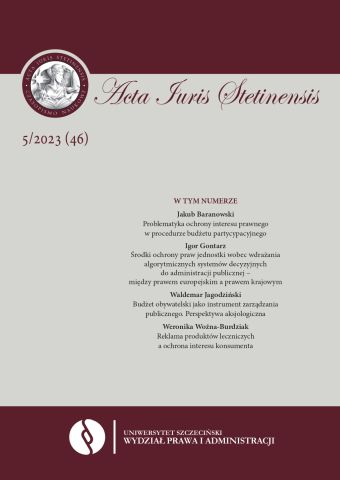Problematyka ochrony interesu prawnego w procedurze budżetu partycypacyjnego
Protection of legal interest in the participatory budget procedure
Author(s): Jakub BaranowskiSubject(s): Law, Constitution, Jurisprudence, Law on Economics, Commercial Law, Administrative Law
Published by: Wydawnictwo Naukowe Uniwersytetu Szczecińskiego
Keywords: legal interest; protection of legal interest; participatory budget; social participation; local self-government law
Summary/Abstract: The basic research objective of this study was made the question of whether the applicable provisions of Polish law protect the legal interest of a citizen who submitted a winning proposal for a task in the civic budget procedure, when this was not included in the municipal budget resolution. In order to provide an answer to the research question posed in this way, an analysis of the Polish legal system with regard to the regulations on the civic budget was carried out, focusing only on the legal regulation of the municipal level, using the dogmaticlegal method as the most appropriate method used in legal sciences, taking into account the assumed problem and research goal. The research was supplemented by the jurisprudence of the Constitutional Court and administrative courts. The main conclusion that could be drawn from the conducted research was that the basic conclusion that could be drawn from the conducted research emphasises the fact that the legal regulations on the civic budget do not provide direct and unambiguous protection of the legal interest of the author of the winning project in the case when it was not included in the budget resolution of the municipality. The lack of substantive legal provisions on the participatory budget means that the legal interest of the author of the winning project can only be attempted to be decoded from the constitutional provisions. The legal institutions analysed in this study (petitions, complaints and applications, supervisory proceedings) did not provide a clear answer as to whether, through their use, the author of the winning task could impartially and independently pursue the protection of his or her legal interest. Only the institution referred to in Article 101(1) of the Act on Municipal Self-Government – a complaint against a resolution to an administrative court – could fulfil the attributes of impartiality and independence in resolving the case. The issues raised in this article have not been the subject of more extensive reflection in the science of administrative law. They are also not the subject of numerous judgments. At the same time, it should be emphasised that the failure to adopt the concept of legal interest in the participatory budget procedure, in particular with regard to the failure to include the winning task in the municipal budget resolution, could result in the exploitation of the stronger position of the municipality in relation to citizens. Therefore, until the legislator takes appropriate legal steps regulating the above issue, it was necessary to discuss the available possibilities of protecting the legal interest of the author of the winning task and, in the opinion of the Author of this study, such a solution was indicated in Article 101, paragraph 1 of the Act on Municipal Self-Government. In pursuit of the set research objectives, the dogmatic-legal method was used, supplemented by an analysis of selected decisions of administrative courts.
Journal: Acta Iuris Stetinensis
- Issue Year: 2023
- Issue No: 46 (5)
- Page Range: 7-20
- Page Count: 14
- Language: Polish

